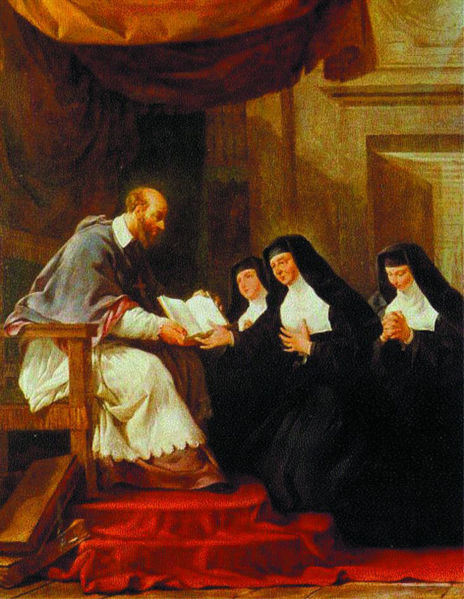“The Most Merciful Man of His Time,” author of
INTRODUCTION TO THE DEVOUT LIFE
Talks given in Santa Fe, June 12 to 17, 2016 by Bro. Brian Dybowski, FSC, PhD
St. Francis de Sales, the most merciful man, lived from 1567 to 1622. He is Doctor of the Church . Brother Brian traced his life as student, priest, bishop, and spiritual father for thousands of people and reviewed how this friendly man rescued many people from John Calvin’s clutches way back then, and still inspires many people today.
Class notes were provided to those who attended the talks and are available in handout from here. From the notes, Brother Brian introduces the famous work of St Francis like this:
Why St Francis wrote his Introduction to the Devout Life
Francis “wrote notes for St Jane de Chantal, to guide her devotion, so that it could bloom and flower. She asked him to develop these notes into a full book, to spread the wealth of his good advice. These notes proved their value by helping her advance toward God, during her very active life. Francis never intended to write a book. But he did comply with St. Jane’s request to share the wealth in his notes. Several theologians also encouraged him to present his unique process of developing devotion. He did not have the time required to write this book. That’s why he calls it a collection of bits of good advice, stated in plain words. He was too busy to develop it in the flowery form that was popular. To save time, he writes instructions directly to “Philothea”. This name stands for everyone who loves God. In Greek philo = love; theos = God. When you see Philothea, see yourself, because of your love for God. Loving God is devotion. You are already started on your journey to God. You have begun to devote yourself.
Outline of the Book’s Parts
Francis identifies five parts of this book. He writes the first to help Philothea improve her simple, natural, desire for God into her solid resolution to love Him through all trials. She solidifies her resolution by doing her ordinary activities. After ridding herself of sins by confessing them in the sacrament of Reconciliation, Philothea commits herself to love God. She applies her determination to enthusiastically decide to love Him entirely. To confirm her conviction, she attends Mass and receives Our Lord in Communion. During this most intimate union, she donates herself entirely to her Savior, thereby completely accepting His love. This effort launches her devout life. Everyone can do this much.
Francis wrote the second part to help Philothea advance toward greater love, to unite more entirely with God. The two steps of this part are simple: frequent the sacraments of confession and communion, and pray more fervently. Francis devotes the third part to developing virtues, which empower Philothea to love God more and more. Here, in this third part, Francis offers advice that ordinary people rarely receive. He fills the fourth part with warning signals to identify enemies, their snares, their attacks, and how to overcome them, as we struggle toward God. After this great effort, Francis writes the fifth part to show Philothea how to rest, refresh herself, and recover her strength to advance further toward heaven.”

